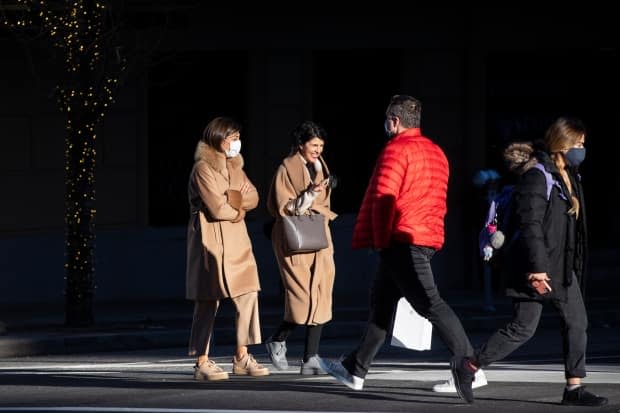Here's what you need to know about the COVID-19 vaccine in B.C.
On Wednesday Canadians woke up to the news that the Pfizer-BioNTech vaccine had been approved by Health Canada, with doses arriving in B.C. as early as this week.
Moderna's vaccine is also expected to be approved soon following promising clinical trial results.
The two vaccines are among several that have been pre-ordered by the Canadian government.
And while the approval of vaccines represents a significant turning point nearly a year into a global pandemic, it also opens up the door to a whole new questions and anxieties.
Here's what you need to know about the distribution of COVID-19 vaccines in B.C. We'll update this story as we learn more information.
When can I get vaccinated?
This is the question on everyone's mind. The province aims to have 400,000 people — just under 10 per cent of B.C.'s population — vaccinated by the end of March. Whether or not you'll be among the first to receive the vaccine will depend on your age, medical history and profession.
"I do have to warn you it is going to be a bit of a road yet," said Provincial Health Officer Dr. Bonnie Henry on Wednesday.
"Eventually everyone who can and wants to get a vaccine will get access."
Who will be first in line?
Staff and residents in long-term care homes, as well as health-care workers, will be the first to receive the vaccine — some as early as this week.
Just under 4,000 doses of the vaccine are set to arrive in B.C. in the coming days and will be distributed to long-term care home workers in the Vancouver Coastal Health and Fraser Health regions.
Next in line will be seniors over the age of 80, people with underlying health conditions, people who are under-housed, and people living in remote and isolated Indigenous communities.
By April, front-line workers including teachers, grocery store workers, firefighters and people working in food processing plants will be prioritized.
As doses increase, Henry says vaccines could be distributed by moving down the population age range in increments. For example, the province could begin distributing vaccines to those aged 75 and above, then 70 and above, etc.
Health Minister Adrian Dix said the staged approach to vaccine distribution "does not reflect anything about our essential quality — it does reflect the vulnerability of people in the population."
How does the vaccine work?
The Pfizer-BioNTech vaccine, as well as the Moderna vaccine, consist of genetic instructions on how to make the modified spike protein from SARS-CoV-2, the coronavirus that causes COVID-19.
The genes are encoded in mRNA and packaged in lipid nanoparticles. Once the vaccine is injected into the body, human cells use the instructions to make copies of the spike protein the immune system will then learn to recognize.
Pfizer's technology includes Vancouver-based Acuitas Therapeutics's lipid nanoparticles to deliver the mRNA after it's injected into our cells.

How many doses are required?
Both the Pfizer-BioNTech and Moderna vaccines require two doses, received at a minimum of 21 days apart. The doses are typically given 28 days apart.
An immunized person becomes fully immune seven days after the second dose, but Henry said immunity is significantly increased after the first dose.
Can everyone get the vaccine?
Henry said that eventually, everyone who wants the vaccine will have access to it.
However, the Pfizer-BioNTech vaccine has not been tested on children under the age of 16, pregnant women, and people who are immunocompromised for a variety of reasons, so those members of the population will not be given the vaccine.
When can life go back to normal?
Henry's best guess? Summer or fall 2021.
She said around 60 to 70 per cent of the population will need to be vaccinated to reach herd immunity — a level of immunity at which it becomes difficult for the virus to find a new person to infect.
"My experience with past pandemics is that once we reach that place, transmission goes down very rapidly. I am hopeful that that will happen once we reach a certain threshold with this virus," she said.
"We're looking at a much different, and much more social summer. And looking into next fall, we're looking at getting back to some semblance of our normal ways of interacting with each other. We'll be able to see each other safely, and the pandemic, I hope, will be on its last legs."
Henry said that at some point, mask wearing and physical distancing measures will come to an end. But practices like handwashing, and staying home when sick, should remain in place.
How will the vaccine be distributed across B.C.?
The province has so far identified nine sites at which the vaccine can be delivered, and plans on identifying 30 in the near future. The location of those sites has not been disclosed.
The logistics around distributing the vaccines are complicated. A disadvantage of mRNA is that it's not very stable, and needs to be stored at very cold temperatures.
The Pfizer-BioNTech needs to be kept at -70 C for longer-term storage, although the company says it can survive five days in a refrigerator.
Moderna says its vaccine can survive a month in the fridge and can be stored for months at regular freezer temperatures of -20 C.
That means approval of the Moderna vaccine will be key for B.C.'s more remote communities.

